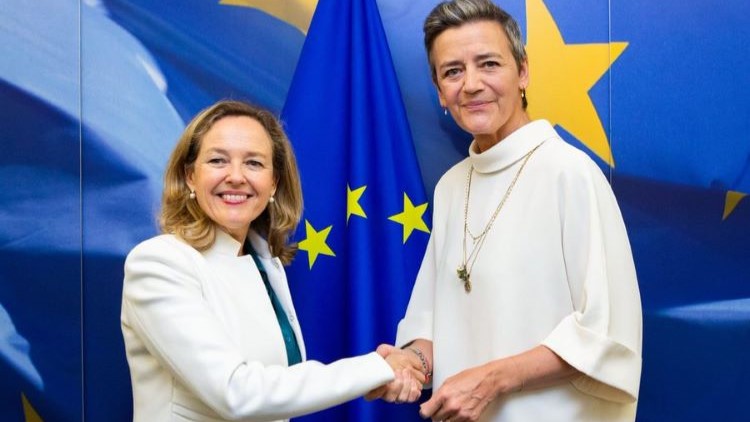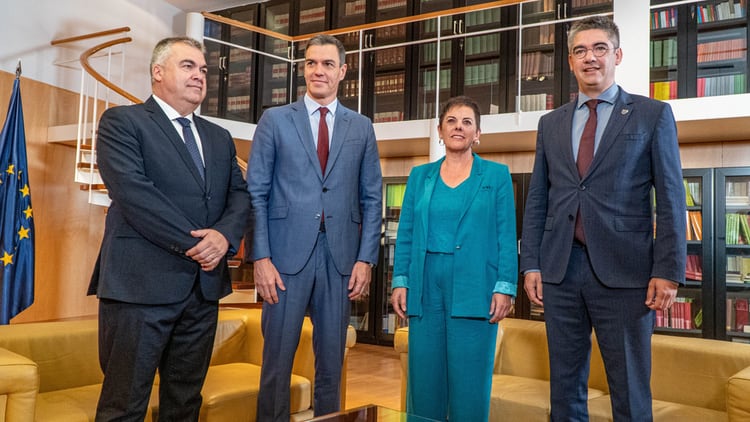Eduardo González
The First Vice-President and Acting Minister of Economic Affairs and Digital Transformation, Nadia Calviño, will participate this week in the Economic and Financial Affairs Council, in which, in addition to the reform of the economic governance framework, the takeover of the presidency of the European Investment Bank (EIB), for which she is herself opting, could be addressed.
This Monday, the Eurogroup meeting will be held in Luxembourg, where the Ministers of Economy and Finance will exchange views with the US Secretary of the Treasury, Janet Yellen, on the global outlook and risks. Ministers will also discuss the future of European financial and capital markets, prepare for the upcoming Euro Summit, discuss euro area priorities with regard to recovery and resilience plans and the implementation of the euro area recommendations, review progress on the digital euro project, and take stock of the IMF and World Bank annual meetings in Marrakech.
Tomorrow, the Economic and Financial Affairs Council will meet, whose main objective is to make progress towards reaching a general orientation on the proposed reform of the economic governance framework, a set of common rules for national fiscal and economic policies that apply to all member states and serve to ensure the sustainability of public finances and foster convergence, while addressing macroeconomic imbalances.
Ministers will also exchange views on the current state of play of the implementation of the Recovery and Resilience Mechanism, hold an exchange of views on the economic and financial implications of Russia’s aggression against Ukraine, seek to adopt Conclusions on climate finance in view of the United Nations Climate Change Conference (COP28) and address the revised EU list of non-cooperative countries and territories for fiscal purposes, among other issues.
The EIB
Although it is not on the agenda, it is not ruled out that during the Council the appointment of the person who, on January 1, will replace the German Werner Hoyer as president of the EIB will be discussed again. Nadia Calviño is among the favorites to get the position, but the fight is particularly complicated.
Her main rival is the Vice-President and European Commissioner for Competition, the Danish Margrethe Vestager, who recently took a temporary leave of absence from the European Commission to focus on her candidacy, but there are three other candidates: the Polish EIB Vice-President Teresa Czerwinska, the former Italian Minister and Deputy Governor of the Bank of Italy Daniele Franco and the Swede and also EIB Vice-President Thomas Östros.
In mid-September, the 27 member states opted to postpone the vote until a greater consensus could be reached, contrary to Calviño’s wishes that the vote should take place during the informal meeting of the Council of Economic and Finance Ministers (Ecofin), which was held at that time in Santiago de Compostela, capital of Galicia, her homeland. At that time, it was already anticipated that the decision could be postponed to the next formal meeting of the EU Finance Ministers, which is precisely the one being held this week in Luxembourg.
The EIB presidency requires the support of 68% of the bank’s capital and at least 18 Member States. Since the participation of each Member State depends on its economic weight in the EU in terms of GDP, it is essential to have the support of the three great economic powers of Europe and main shareholders of the bank, based in Luxembourg: Germany, France and Italy. Spain has 11% of the shareholding and these three countries hold 19% each. The sum of the four countries would therefore ensure the necessary 68%, regardless of the vote of the rest.
According to sources consulted by the newspaper El Mundo, the major countries have not yet made a decision. Italy has its own candidate, although with few options; France could support Nadia Calviño, after the discrepancies of recent years between President Emmanuel Macron and Margrethe Vestager; and the German Chancellor, Olaf Scholz, seems to support the Spaniard, but his Minister of Finance, and key partner in the coalition government, prefers his Danish liberal colleague. The fact that the doubts coincide with the negotiations on the fiscal rules, in which Germany has shown itself to be the toughest negotiator, provides a good asset for Berlin to put pressure on or. to sell its vote dearly, the Madrid daily added.
The EIB, founded in 1958 after the entry into force of the Treaty of Rome that established the European Economic Community (EEC), is the main financial arm of the EU and is one of the largest development institutions in the world. Whether Calviño or Vestager (the two main candidates) wins, she would be the first woman to head the institution since its foundation 65 years ago. For Calviño, this candidacy is especially relevant after her failed attempts to lead the International Monetary Fund (IMF) after Christine Lagarde’s departure to the European Central Bank (ECB) and to chair the Eurogroup, formed by the economic ministers of the Eurozone.







